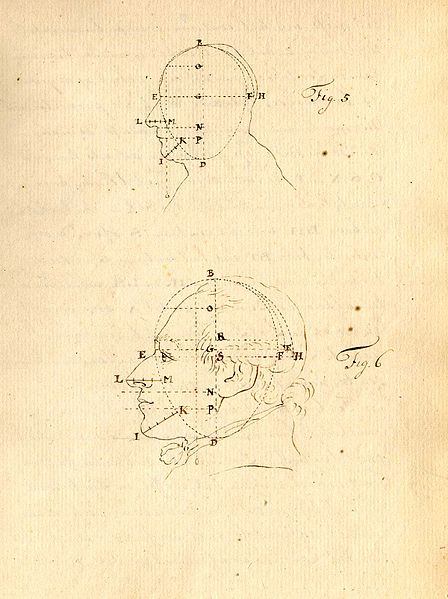File:Dutch p09.jpg

Original file (1,200 × 1,605 pixels, file size: 192 KB, MIME type: image/jpeg)
Captions
Captions
Summary
edit| DescriptionDutch p09.jpg |
English: Anonymous. [tise on physiognomy. (Netherlands?, ca. 1790)].
Physiognomy is the science of relating an individual's character, personality, and temperament to the shape of his or her face, head, and/or body. The theories behind it go back to Hippocrates, who believed that physical characteristics of the human body revealed personality traits; Aristotle performed studies on how hair, limbs and facial features predicted personality and temperament. Such theories thrived throughout the Middle Ages and the Renaissance, and the noted Girolamo Cardano (1501-1576) was one of its main proponents. By the 18th century, the study of physiognomy was still taken very seriously as a medical topic, with important additions to the field made by Johann Caspar Lavater (1741-1801). Franz Josef Gall (1758-1828) attempted to make its study even more scientific by measuring human and animal craniums to find correlations between skull shape and behavior, founding the field of phrenology. The author of this fine, manuscript treatise and sketchbook on physiognomy is unknown. The text is written in Dutch and was probably composed in the 1790s; it is possible that it was created as a dissertation by a medical student. Further Reading: Hagner, M. "Prolegomena to a history of radical brains in the nineteenth century: physiognomics, phrenology, brain anatomy." Physis Riv Int Stor Sci., 1999; 36(2):321-38. Howells, J. G.; and M. L. Osborn. A reference companion to the history of psychology. (Westport, CT: Greenwood Press, 1984). Jenkinson, J. "Face facts: a history of physiognomy from ancient Mesopotamia to the end of the 19th century." J Biocommun., 1997; 24(3):2-7. An example of the 20th-century clinical literature on physiognomy: Paterson, D. G. Physique and intellect. (New York: The Century Company, 1930). |
| Date | |
| Source | https://www.nlm.nih.gov/exhibition/historicalanatomies/dutch_home.html |
| Author | Anonymous. [tise on physiognomy. (Netherlands?, ca. 1790)]. |
Licensing
edit|
This is a faithful photographic reproduction of a two-dimensional, public domain work of art. The work of art itself is in the public domain for the following reason:
The official position taken by the Wikimedia Foundation is that "faithful reproductions of two-dimensional public domain works of art are public domain". This photographic reproduction is therefore also considered to be in the public domain in the United States. In other jurisdictions, re-use of this content may be restricted; see Reuse of PD-Art photographs for details. {{PD-Art}} template without license parameter: please specify why the underlying work is public domain in both the source country and the United States
(Usage: {{PD-Art|1=|deathyear=''year of author's death''|country=''source country''}}, where parameter 1= can be PD-old-auto, PD-old-auto-expired, PD-old-auto-1996, PD-old-100 or similar. See Commons:Multi-license copyright tags for more information.) | |||||
File history
Click on a date/time to view the file as it appeared at that time.
| Date/Time | Thumbnail | Dimensions | User | Comment | |
|---|---|---|---|---|---|
| current | 08:59, 18 November 2013 |  | 1,200 × 1,605 (192 KB) | CFCF (talk | contribs) | User created page with UploadWizard |
You cannot overwrite this file.
File usage on Commons
There are no pages that use this file.